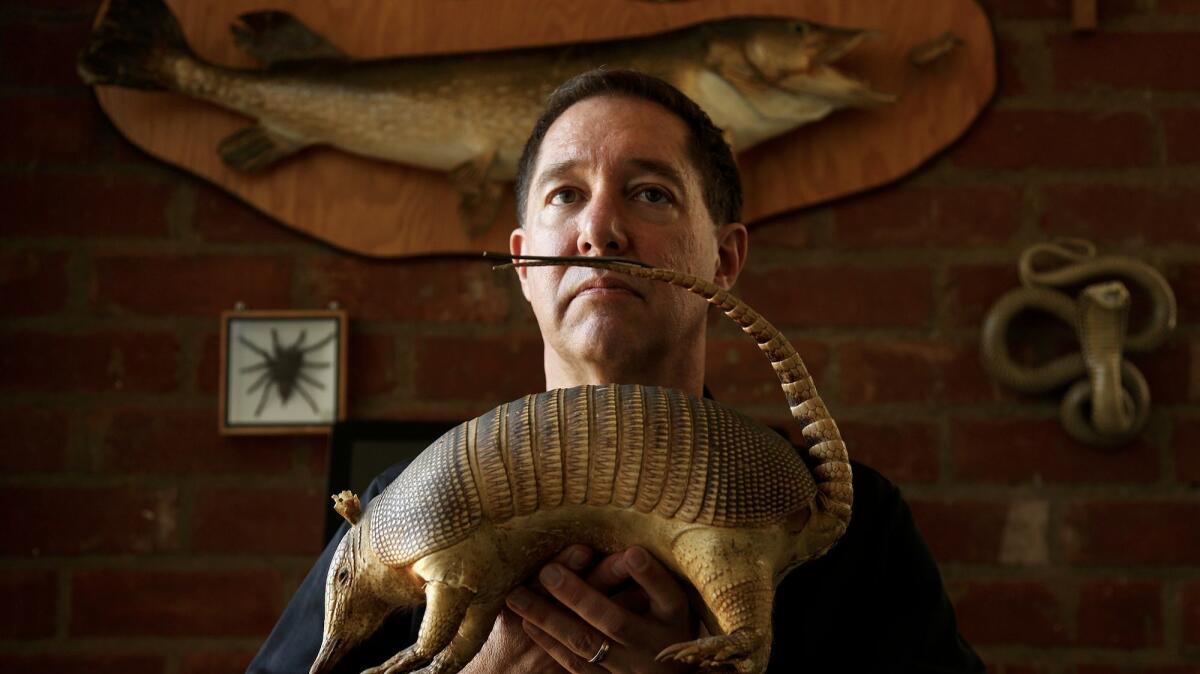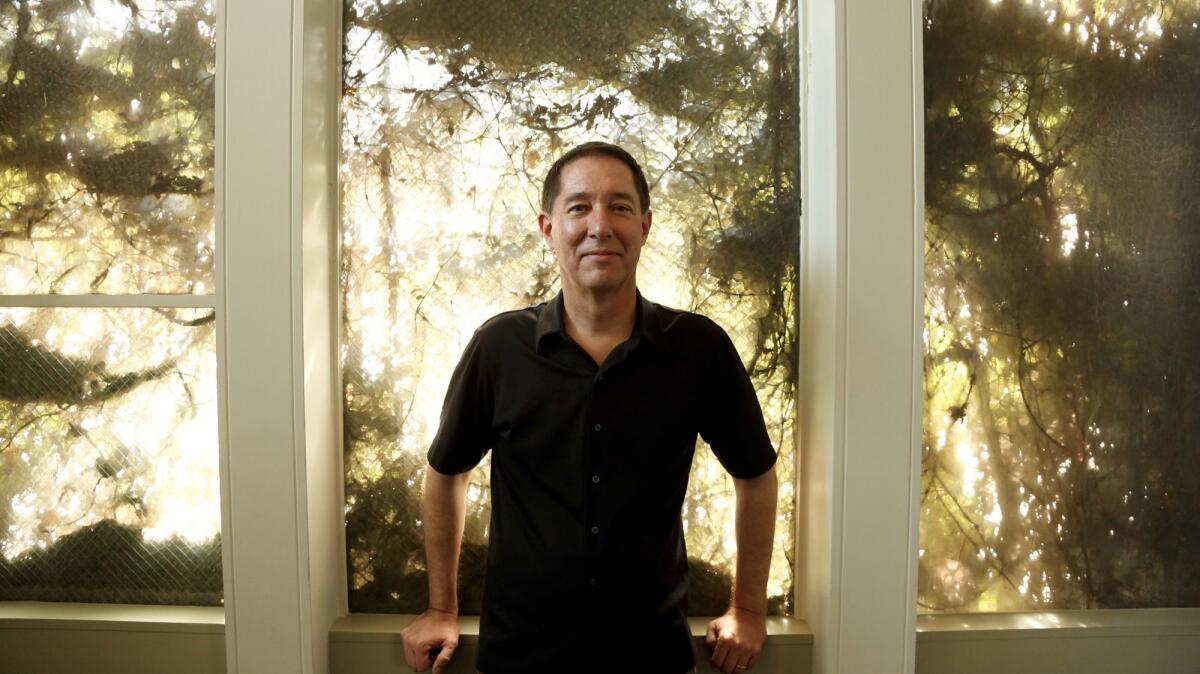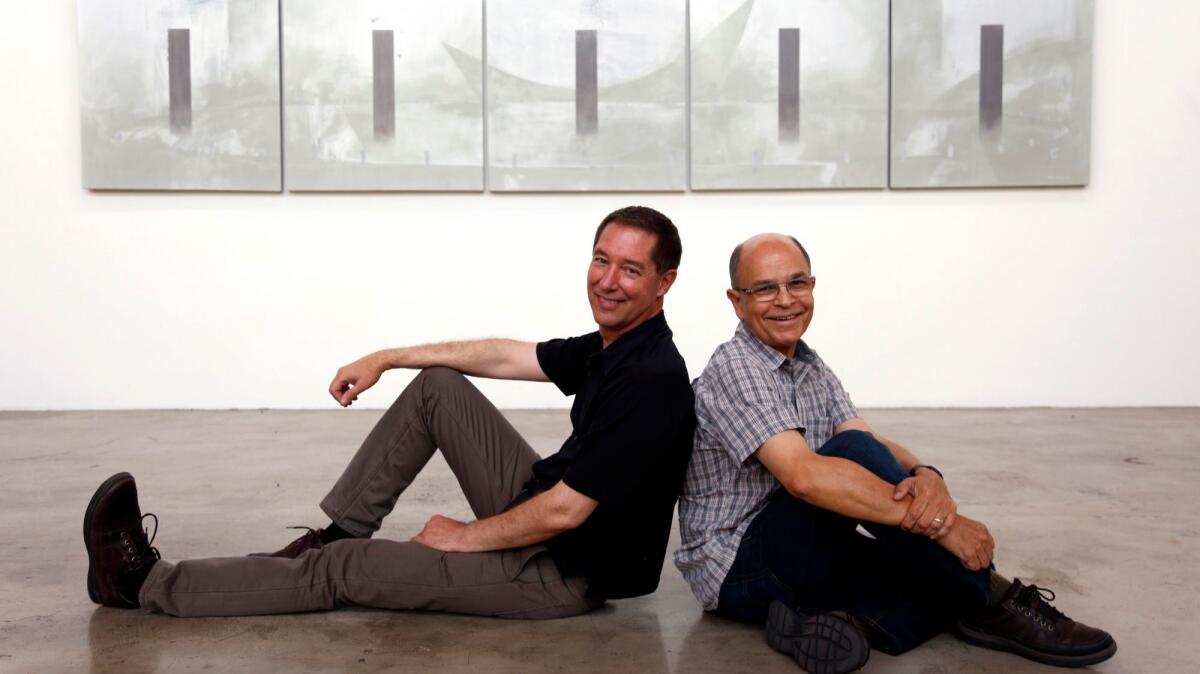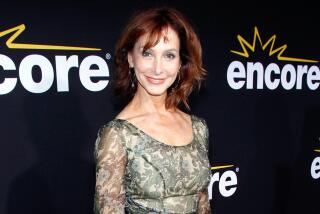He’s big in L.A.’s small theaters: Tom Jacobson, master of puzzles, surprises and brain-teasers

Churchgoer. Gymgoer. Fundraising executive. Devoted spouse, son and colleague.
This is the trickster of Los Angeles theater? My, but Tom Jacobson’s still waters run deep.
He is, after all, the playwright who gathers Oscar Wilde, Bram Stoker and Arthur Conan Doyle for an encounter with what might be a vampire or, even scarier, the embodiment of hidden desires (“Tainted Blood”); who turns an acting audition into a conduit for the ghosts of a ruinous 1914 same-sex vice sting (“The Twentieth-Century Way”); and who, in rhyming couplets, sails King Louis XVI, Marie Antoinette and a Yankee whaler off on a sociopolitical quest (“Sperm”).
History, sexuality, religion and the transformative power of theater are but a few of the topics that he swirls together in plays that often are constructed like puzzles or that kaleidoscopically shift styles.

“I like the audience to have to work a little bit,” he says.
This subversiveness can be hard to spot in person, though.
During an afternoon’s conversation, the only hint of his darker depths is a confession that as a high schooler in Oklahoma City he helped to stage elaborately macabre environments to which he and his friends would lure unsuspecting kids. The one he describes with particular relish was a fake devil worship site at an abandoned farm, complete with charred bones (cow) and a note signed in blood (pimple).
Otherwise, this trim and wholesome-looking 56-year-old mostly comes across as friendly and common-sensical — just the sort of person that his Lutheran upbringing would suggest.
Jacobson is now onstage with Open Fist’s premiere of “Walking to Buchenwald,” inspired by a trip to Europe that he and his partner, artist-educator Ramone Muñoz, made with Jacobson’s parents in 2002. The tale begins comically with minor skirmishes over itineraries and the parents’ eating and nap schedules. Then world events intrude. A key occurrence, envisioned a decade and a half ago when Jacobson sat down to write the play, eerily parallels recent escalations.
Just weeks ago, Skylight Theatre presented a very different Jacobson play: “The Devil’s Wife,” an old Italian folk tale revamped as a playful study of gender politics, love and belief.
“I like to try new things,” he says of his restless exploration. The goal: “capitalizing on what theater is, which is a live experience where things can change.”
The abutting productions reflect one of Jacobson’s key traits across three decades in L.A. theater: He is prolific.
He’s had 39 plays produced and has written about 30 others. The work has been staged by an array of L.A.’s small companies, including such probingly inquisitive groups as the Road, Theatre @ Boston Court, Playwrights’ Arena, Circle X, Rogue Machine, Ensemble Studio Theatre/L.A. and Celebration.
This ubiquity “is a sign of how broadly appreciated his work is,” says Michael Michetti, Boston Court’s co-artistic director and the director of some of Jacobson’s most successful plays. “People really respect that Tom does plays with big ideas. As a director, I love having something that is rich, layered — smarter than I am — that encourages me to use all of my tools to fulfill it.”
Although Jacobson “has not so much broken into the larger theaters,” Michetti says, “I hope there will be a point where some of the bigger theaters start looking at his work.”
A band/choir/drama/journalism kid in high school, Jacobson studied acting and playwriting at Northwestern University near Chicago, then earned a master of fine arts in playwriting at UCLA.
“I make no money as a playwright,” he says, almost chuckling. “Goodness, that’s a deficit; I lose money. I don’t think there’s a playwright alive who makes a living as a playwright. The ones who are successful make a living as a screenwriter, a TV writer or a teacher or something else.”
Jacobson’s something else is the Natural History Museum of Los Angeles County, where he is senior vice president of advancement, overseeing fundraising — a skill he developed at the Los Angeles County Museum of Art, where he progressed from secretary to grant writer, then fundraiser.
He has settled into a chair in the home that he and Muñoz converted from what was once the production studio of the late textile designer Maria Kipp, whose work was favored by such Modernist architects as Richard Neutra and Rudolph Schindler. The two-story, 7,000-square-foot structure in Los Angeles’ Koreatown neighborhood contains a writing retreat for Jacobson and a studio/gallery for Muñoz.
Like the parents in “Walking to Buchenwald,” Jacobson’s late father taught university-level theater and his mother was an elementary school teacher who later ran the store in a science museum. “I am my parents,” he says, delighting in the serendipity.
His museum job spills beyond 40 hours a week but allows flexibility. It’s also “very inspirational,” he says. “I’ve written a number of plays that I learned about the subject matter at the museum.”
A lifelong fan of history, he is drawn to its “amazing stories” that “tell us about us.”
Beyond work, Jacobson finds ideas popping up in art or other cultural excursions, or in what he reads. “I’m very inspired by stories,” he says, “sometimes the more outrageous the better.”
And then there’s travel.
When his family made the trip that inspired “Buchenwald,” Jacobson’s parents were in their early 70s. They had never traveled overseas, but their innate sociability — Muñoz affectionately describes them as a “very ‘Prairie Home Companion’ kind of Lutherans” — helped to make the experience more immersive. “His dad and especially his mom were quite uninhibited to approach people and just ask questions, even invite them to our table,” Muñoz recalls.
The trip coincided with America’s gear-up to enter Iraq to challenge Saddam Hussein.
“We were having very interesting conversations with Europeans about the United States,” Jacobson says. “All of us were feeling very passionate against the war and afraid of what it could lead to.”
Shortly after the trip, he began writing.
The play references no specific time period or president. “It was intended to be evergreen,” Jacobson says. “It could have taken place then, and it could take place now.”
The script didn’t get produced during the George W. Bush years, then seemed to lose its urgency through what Jacobson quippingly calls the “no-drama Obama” presidency. But last fall, as the political landscape changed, Open Fist scheduled a reading of the script, and now, he says, “I’m worried that events will get ahead of the play.”
Jacobson hopes he’s delivered a story about “finding out who you are,” he says, “and accepting the worst thing” — which includes “the worst thing about who we are as Americans.”
That might sound like cynicism, but in the play it comes across as calm rationality — with maybe a touch of hope.
Asked what personality traits lend themselves to Jacobson’s writing, Muñoz replies: “He’s a bit of a romantic; he likes to think that there’s a meaning to life and that things all connect and there’s a reason why things happen.
“He is definitely an optimist.”
In addition to “Buchenwald’s” mischievous refusal to stick to comedy or drama, it contains an invitation to play. The younger couple’s names are purposely genderless, which frees casting possibilities. At Open Fist, a male couple alternates performances with a female one, with some heterosexual pairings scheduled as well.
To land as many productions as he does, Jacobson employs good, old-fashioned perseverance. He keeps his work in presenters’ minds by submitting scripts to reading series and sending plays to directors.
“You have to make your own way,” he explains. “You have to create and maintain relationships. It’s a lot of work, but it’s a great pleasure. The theater community here is enormous, it is passionate, it is beleaguered. We care a great deal about each other.”
In addition to writing, Jacobson has served as literary manager for Celebration and Boston Court and briefly was co-artistic director of EST/L.A.
Landing productions in larger theaters and other cities has been difficult, though. Just a couple of Jacobson’s plays have racked up miles: “The Twentieth-Century Way,” which played off-Broadway in 2015 and off-West End in London this year, and his time-hopping theater character mashup “Bunbury.”
The elephant in the room is the larger Los Angeles theaters that have yet to stage his work. “Regional theaters have large houses they need to fill,” Jacobson says, which “means that the shows on their stages have to be relatively low-risk.” Smaller theaters “have less at stake, they can take more risks.”
“That makes perfect sense to me,” he concedes. Still, it’s a Catch-22 because to be presented in a large theater he needs to have already proved himself in a large theater.
He’s made inroads. L.A.’s regional powerhouse, Center Theatre Group, invited him to spend a year in its L.A. Writers’ Workshop, a developmental feedback group, in 2015-16. He used the opportunity to shape an idea derived from L.A. history into a trilogy that he’s now trying to line up for simultaneous productions in small theaters next year.
The going can be rough. The payoff? Finally getting a play in front of theatergoers so that — and here the trickster reveals himself again — he can challenge them to “think about themselves, how they might change, how they could be better.”

♦ ♦ ♦ ♦ ♦ ♦ ♦ ♦ ♦ ♦
‘Walking to Buchenwald’
Where: Open Fist at Atwater Village Theatre, 3269 Casitas Ave., L.A.
When: 8 p.m. Thursdays-Saturdays, 7 p.m. Sundays; ends Oct. 21
Tickets: $30
Info: (323) 882-6912, www.openfist.org
Twitter: @darylhmiller
UPDATES:
1:30 p.m. Oct. 4: This story has been expanded with additional comment from Tom Jacobson and director Michael Michetti about getting larger theaters interested in Jacobson’s plays.
This story was originally published at 10:35 a.m. Sept. 20.
More to Read
The biggest entertainment stories
Get our big stories about Hollywood, film, television, music, arts, culture and more right in your inbox as soon as they publish.
You may occasionally receive promotional content from the Los Angeles Times.











